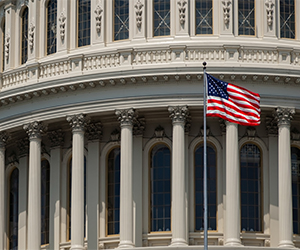CARES coronavirus relief act: What you and your business need to know

As new guidelines, funding, and other updates are released for these provisions and programs, visit our Coronavirus Resource Center for our latest information and guidance. You can also contact our national SBA loan task force or your CohnReznick engagement team for assistance with filing for these loans and providing required financial documentation.
After nearly a week of heated negotiation, the Coronavirus Aid, Relief, and Economic Security Act (CARES, H.R. 748) was signed into law by the President Donald Trump on March 27, 2020. The Act is intended to help Americans deal with the economic impact and health crisis brought on by the outbreak of COVID-19.
CohnReznick believes that for American workers, small businesses, and families, relief is on the horizon. This legislation will bolster our healthcare system, strengthen our medical professionals and first responders, shore up our economy, workers, and businesses, support those who are unemployed, and help prevent millions from losing their jobs. We are pleased that Congress has come together in a bipartisan fashion to advance this critical legislation that will provide desperately needed relief to the American people.
The massive size of the pandemic relief legislation, and the legislation yet to come, will continue to create many questions, and those answers will create even more questions in the future. Congress will have to decide how to provide further fixes to our economy without being physically in Washington, D.C. Industries and jobs that are affected without current solutions in this legislation will have to be addressed. We believe that as we navigate together, we learn together.
The Act is epic in its proportion, set to infuse $2 trillion dollars into all sectors of the economy, including healthcare, financial firms, airlines, and other businesses small and large, as well as directly to individuals. The aid will come in various ways, including through direct payments, loans, and changes to tax provisions.
Read on for highlights from the Senate’s final version of the Act, as well as from a Senate committee’s overview of the tax and unemployment insurance provisions.
Paycheck Protection Program
The Act appropriates $349 billion for the Paycheck Protection Program to help small businesses (including 501(c)(3) and (19) organizations and certain tribal business concerns) with fewer than 500 employees, and businesses in NAICS Sector 72 (Accommodation and Food Services) with fewer than 500 employees per location, cover payroll (for employees making up to $100,000 per year) and other expenses from Feb. 15, 2020, to June 30, 2020. Sole proprietorships, independent contractors, and other self-employed individuals are also eligible for loans. The loan amount is a formula based on the payroll costs incurred by the business, with a maximum loan of $10 million. These loans could possibly be forgiven in certain situations. Loans must be used for payroll, health care benefits, lease, interest on mortgage, rent, and utilities. Recipients must also not be receiving duplicative funds from another SBA program. Learn more in our overview of the Paycheck Protection Program.Healthcare
The Act provides billions for a “Public Health and Social Services Emergency Fund,” for programs including public health and social services, hospitals, and healthcare providers facing COVID-19-related expenses and lost revenue.
There are many provisions covered under this section of the Act, most notably those for mitigating or preventing the potential for drug and supply shortages; increasing healthcare coverage of testing and vaccines for COVID-19 patients; allowing certain telehealth to be covered by high-deductible health plans (HDHP); paving the way for certain government authorities to partner with private institutions to drive pharmaceutical drug innovation and development; establishing a Ready Reserve Corps for public health emergencies; and relaxing certain telehealth requirements to accommodate for enhanced usability.
The Act also includes reauthorizations for the Healthy Start program, Health Resources and Services Administration grant programs for telehealth and rural health, and certain healthcare workforce programs. The Act provides extensions for certain Medicare programs, Medicaid programs, public health programs, and other health programs.
Coronavirus relief funds
The Act establishes a fund for eligible businesses that have or are expected to incur losses because of the COVID-19 crisis, to help them stabilize amid the business disruption. The $500 billion appropriated for this fund will provide direct loans, loan guarantees, and other investments to various industries including passenger airlines, cargo airlines, and businesses crucial to national security. For those that receive investments or loans, the Act limits stock buybacks, certain dividends, certain workforce reductions, and total compensation to certain highly paid workers.
We will provide additional information on this program as details become available.
Mid-size businesses
The act charges the Treasury Secretary with working to form a program to help mid-size businesses and nonprofits with between 500 and 10,000 employees. These businesses may receive loans at low interest rates (not higher than 2 percent per annum), but must make certain certifications for workforce retention, pay, and benefits; not sending jobs offshore; abiding by existing collective bargaining agreements; and not interfering with certain efforts to organize unions.Financial firms
The Act makes certain changes to laws relating to the banking and financial industries (including the 2010 Dodd-Frank Act) to assist those impacted by COVID-19. Certain provisions of note include relaxing credit reporting requirements for those unable to make payments due to the outbreak, prohibiting foreclosures on certain mortgages and providing a grace period for borrowers.Tax
Individuals
- Recovery checks to individual taxpayers: To provide immediate cash assistance to Americans and their families, the Act provides checks of up to $1,200 ($2,400 for those married filing jointly) to many U.S. taxpayers. The amounts paid would be increased by $500 for each of the taxpayer’s qualifying children. Treasury Secretary Steven Mnuchin has indicated that the goal was to issue payments to eligible taxpayers within three weeks of enactment, but actual timing was not known as of the writing of this alert.
The payments are reduced for higher-income taxpayers; they begin phasing out for taxpayers with adjusted gross income (AGI) of $75,000 for single, $112,500 for head-of-household filers, and $150,000 for those married filing jointly. The IRS will base these amounts on the taxpayer’s 2019 tax return, or 2018 tax returns if 2019 has not yet been filed.
- Penalty waived for early withdrawal from retirement funds and temporary waiver of required minimum distributions: Individuals may withdraw up to $100,000 from qualified retirement accounts for coronavirus-related purposes without being subject to the 10 percent early withdrawal penalty. Additional relief is provided in that the income from these distributions is subject to tax ratably over a three-year period. Individuals may recontribute amounts withdrawn to eligible retirement funds within three years (regardless of that year’s contribution limit).
Taxpayers are also temporarily relieved of the requirement to take temporary minimum distributions from certain retirement plans and accounts.
- Single-employer plan funding rules: The Act extends the due date for contributions due for defined benefit plans in 2020 until the start of 2021 for single-employer plan companies, providing more time for such companies to meet their funding obligations.
- Charitable contributions: The “50 percent of AGI” deduction limitation for individuals who itemize is suspended for 2020. Additionally, taxpayers who do not itemize are able to deduct up to $300 of cash contributions to charitable organizations as “above the line” deductions.
- Exclusion of certain employer payments of student loans: Employers may contribute up to $5,250 toward an employee’s student loans in 2020, and those contributions are excluded from the employee’s income. The $5,250 cap that generally applies to employer-provided educational assistance applies both to the new student loan repayment benefit and to other educational assistance provided by the employer.
- Expanded Unemployment: The Act vastly expands unemployment benefit assistance for those impacted by COVID-19, including Pandemic Unemployment Assistance to individuals not traditionally eligible for these benefits (including people who are self-employed, are independent contractors, or have limited work history).
The Act also increases payments for unemployed individuals. In addition to the state payment an individual is otherwise entitled to under state law, the Act provides each recipient of unemployment insurance or Pandemic Unemployment Assistance with an additional payment of $600 per week for up to four months.
Numerous other unemployment assistance provisions are included in the Act, sending billions of dollars to individuals and grants to state agencies to support those affected by COVID-19.
Businesses
- Employee retention credit for employers closed because of COVID-19: The Act provides a refundable payroll tax credit for each calendar quarter, beginning March 13, 2020, through Dec. 31, 2020, equal to 50 percent of wages paid to employees during the outbreak by employers whose operations were fully or partially closed due to a COVID-19-related shut-down order, or whose gross receipts declined by more than 50 percent compared to the same quarter in the prior year.
The credit is based on qualified wages paid to employees, and provided for the first $10,000 of compensation paid to an eligible employee, including health insurance.
For employers with 100 or fewer employees, all employee wages are qualified wages and eligible for the credit, regardless of whether the business is subject to shut-down order. For employers with more than 100 full-time employees, qualified wages are those paid to employees when they are not providing services because of COVID-19-related circumstances as described above (i.e., full or partial closure, or a 50 percent gross receipts decline).
Taxpayers are not eligible for this credit if they take a small business interruption loan.
- Charitable contributions: The Act increases the 10 percent limitation for corporations to 25 percent of taxable income.
- Delay of employer payroll taxes: The Act allows eligible employers and self-employed individuals to defer paying a 6.2 percent Social Security tax on employee wages. The deferred employment tax is to be paid over the following two years: half by Dec. 31, 2021, and the other half by Dec. 31, 2022.
- Temporary exception from excise tax for alcohol used to produce hand sanitizer: Taxpayers are excepted from excise tax for distilled spirits removed in 2020 and used for hand sanitizer produced and distributed in response to COVID-19.
Businesses: Changes to certain provisions of the TCJA
- Modifications of net operating losses (NOLs): Under the TCJA, NOLs are limited to 80 percent of current year taxable income, and may not be carried back to prior tax years (i.e., to generate refunds). The Act permits a loss from taxable years 2018, 2019, and 2020 to be carried back five years to generate refunds, and removes the taxable income limitation to allow NOLs to fully offset income for tax years 2018, 2019 and 2020. Additionally, the Act removes the excess business loss limitation of Section 461(l) applicable to pass-through business owners and sole proprietors for tax years 2018, 2019 and 2020 so they can also benefit from the modified NOL carryback rules.
- Accelerated recovery of corporate alternative minimum tax (AMT) credits: The TCJA repealed the corporate AMT, and made corporations wait several years before recovering their AMT credits. The Act allows corporations to recover these credits now.
- Increase in interest deductions permitted under IRC Section 163(j): The TCJA limited interest deductions to a portion of an entity’s adjusted taxable income (ATI). The Act generally raises the limit on interest deductions from 30 percent of ATI to 50 percent for taxable years beginning in 2019 and 2020, allowing taxpayers more leeway in deducting interest.
For partnerships, the 2019 limitation remains at 30 percent. However, a special rule for partnerships allows 50 percent of any excess business interest allocated to a partner in 2019 to be deductible in 2020 and not subject to the 50% (formerly 30%) ATI limitation. The remaining 50% of excess business interest from 2019 is subject to the ATI limitation in 2020. The ATI limitation for 2020 is 50% of partnership ATI, and partnerships may elect to use 2019 partnership ATI in calculating their 2020 limitation.
Businesses: Technical Correction to a Provision in the TCJA
- Qualified improvement property: A drafting error in the TCJA required a 39-year depreciable life for qualified improvement property (generally, certain improvements to a building’s interior). The Act corrects this error, and makes it 15-year depreciable property, as intended. This will allow businesses to deduct the expense of these improvements immediately because they will be eligible for 100% bonus depreciation. They will also be able to potentially amend prior-year tax returns to adjust for this correction and potentially claim refunds.
What does CohnReznick think?
The CARE Act is another of what we believe will be a number of legislative efforts intended to bolster the economy and aid taxpayers in the wake of the COVID-19 outbreak. Included in the plethora of provisions in this $2 trillion Act are measures to send checks to many Americans, delay employer payroll taxes, expand unemployment assistance, and change certain provisions of the TCJA, including providing a much-awaited technical correction to a drafting error within the TCJA. These provisions are intended to alleviate the financial burden many taxpayers currently face by allowing them to retain cash and to amend prior-year tax returns to get refunds in this troubled economic environment. We expect administrative guidance in the days and weeks to come and are watching developments closely. Please consult your tax advisor with any questions on how these provisions might impact you and your business.Contact
Patrick Duffany, Managing Partner, Tax
959.200.7270
Brian Newman, Partner, Practice Leader, Federal Tax Services
959.200.7009

Patrick Duffany

Brian Newman
Contact
Let’s start a conversation about your company’s strategic goals and vision for the future.
Please fill all required fields*
Please verify your information and check to see if all require fields have been filled in.

On-Demand Webinar: Obtaining COVID-19 Financial Relief

Understanding a Key Provision in the CARES Coronavirus Relief Act: The Paycheck Protection Program

On-Demand Webinar: Mitigating Coronavirus Disruption

Coronavirus Resource Center
Related services
Any advice contained in this communication, including attachments and enclosures, is not intended as a thorough, in-depth analysis of specific issues. Nor is it sufficient to avoid tax-related penalties. This has been prepared for information purposes and general guidance only and does not constitute legal or professional advice. You should not act upon the information contained in this publication without obtaining specific professional advice specific to, among other things, your individual facts, circumstances and jurisdiction. No representation or warranty (express or implied) is made as to the accuracy or completeness of the information contained in this publication, and CohnReznick LLP, its partners, employees and agents accept no liability, and disclaim all responsibility, for the consequences of you or anyone else acting, or refraining to act, in reliance on the information contained in this publication or for any decision based on it.










